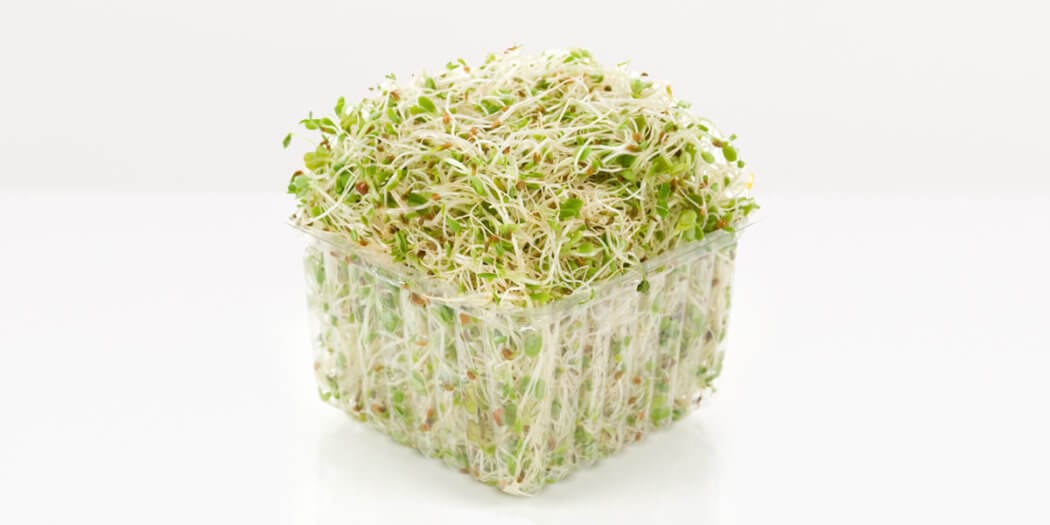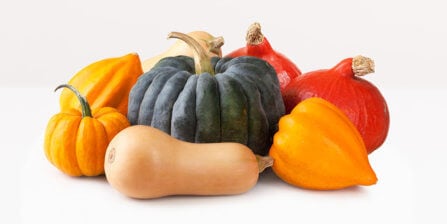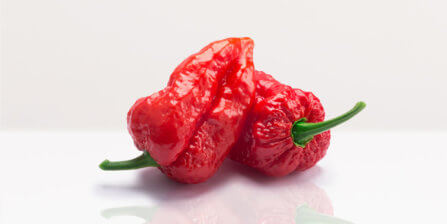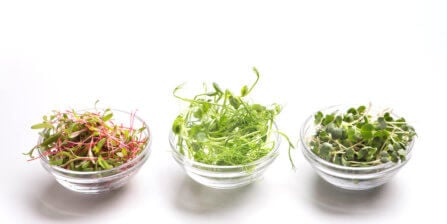Grocery Guides
Alfalfa Sprouts – All You Need to Know | The Instacart Guide to Fresh Produce

What are alfalfa sprouts?
Alfalfa sprouts are a member of the pea family, distinguished by their long, slim stems, which end in small clusters of tiny green leaves. They’re derived from seeds harvested from a plant known as alfalfa in the United States, but also called lucerne in some parts of Europe as well as in countries like India, Australia, and New Zealand.
Humans generally don’t eat fully grown alfalfa plants as their leaves are too bitter – instead, the alfalfa plant is used in many parts of the world to feed livestock, especially cows and horses. However, the sprouts grown from germinated alfalfa seeds are a different matter entirely. Don’t confuse them with alfalfa microgreens, which are still young greens, but are allowed to grow for slightly longer (around eight to twelve days total) before they are cut.
Unlike sprouts, microgreens are cut from the seed. Alfalfa sprouts grow quickly and have a pleasant, nutty flavor and crisp texture. A handful of light, flavorful alfalfa sprouts adds a low-calorie, nutrition-packed crunch to salads and sandwiches, and they’ve long been a staple ingredient of South India’s vegetarian cooking tradition.
Where did alfalfa sprouts originate from?
The alfalfa plant is grown in many countries worldwide, but is believed to have its roots in southern and central Asia. Ancient Greek sources credited the Persian empire (modern-day Iran) as the original home of alfalfa. The name alfalfa is derived from the Arabic phrase al-fac-facah, which translates as “father of all foods,” a reference to the plant’s nutritional value.
What is the nutritional value of alfalfa sprouts?
Alfalfa sprouts pack a nutritional punch that belies their size. One cup (33g) of alfalfa sprouts contains 7.6 calories, 0.7g of carbohydrates, 0.2g of fat, and 1.3g of protein. Alfalfa sprouts are an excellent source of vitamin K, which plays a critical role in helping the body absorb calcium to strengthen bones and teeth. A single-cup serving will provide 13% of your DV for vitamin K. Alfalfa sprouts also contain a variety of vitamins and minerals, including vitamin C (5%DV), copper (3%), manganese (3%), and zinc (2%).
How are alfalfa sprouts grown?
Commercially grown alfalfa sprouts are grown by soaking and irrigating the seeds for around three to ten days. They can also be grown easily at home by mixing the seeds with water in a canning jar. It’s a simple process that will yield a crop of fresh alfalfa sprouts within three to four days, but be vigilant: the seeds and later sprouts must be rinsed at regular intervals to prevent any buildup of bacteria. Budding home growers can navigate the process with step-by-step guides like this one on YouTube.
When are alfalfa sprouts in season?
Happily, alfalfa sprouts are never out of season! Since they’re easily germinated from the seeds and are ready to eat within a matter of days, fresh alfalfa sprouts are never too hard to find. They can be grown at home or picked up at the grocery store year-round. Just be stringent in buying high-quality sprouts from a reliable source and making sure to wash the produce carefully before use.
What should I look for when buying alfalfa sprouts?
Look for sprouts with healthy white stems and green tops. Steer clear of any sprouts whose stems are brown or appear mushy. Most importantly, safety considerations dictate that alfalfa sprouts should only be purchased from a reputable grocery store that stocks fresh, high-quality vegetables. Alfalfa sprouts must be refrigerated well, so they should only be found in the grocery store’s fresh produce section.
How to store alfalfa sprouts?
After buying alfalfa sprouts, transfer them to a refrigerator as soon as possible. Store-bought alfalfa sprouts should come in a ventilated container. If not, transfer your sprouts to a small bowl covered with plastic wrap or a zip-top bag, but in either case, pierce a few holes in the wrap or bag to ensure the sprouts can “breathe.” Place the sprouts in the crisper section of the refrigerator. Freezing is not recommended for fragile alfalfa sprouts. Always wash alfalfa sprouts thoroughly before consumption.
How long do alfalfa sprouts last?
Two to three days is the maximum that alfalfa sprouts can be safely stored in the refrigerator. Do not consume alfalfa sprouts that have been stored any longer than this.
How to tell if alfalfa sprouts are bad?
Alfalfa sprouts are susceptible to picking up and carrying bacteria, so they have to be handled with a high degree of caution. Don’t take any chances with sprouts that appear to be anything less than perfectly fresh. Red flags include any sign of mold, excess moisture, browning or yellowing of the stems, mushy appearance, or smells indicating the sprouts may have gone bad. Sprouts that show any of the above should be disposed of immediately.
If you are looking to have your groceries delivered, you can easily shop for alfalfa sprouts via Instacart. After adding a product to your cart, use the “Instructions” option to notify your Instacart shopper about any preferences or specific directions on how to choose the best products. Shop for alfalfa sprouts.
What can I substitute for alfalfa sprouts?
Mung bean sprouts and sunflower sprouts are two of the most common substitutes, though both have a milder flavor than alfalfa.
There are plenty of other sprouts to choose from, including lentil sprouts, soybean sprouts, and broccoli sprouts. Some of these may look similar to each other and have similar crunchy textures, but they can vary significantly in flavor. For example, lentil sprouts have a more peppery flavor, while broccoli sprouts have a fresh, spicy kick. Mung bean sprouts are thicker and crunchier than alfalfas, but are less flavorsome than soybean sprouts. Research the subtle differences of flavor and texture that characterize each sprout and choose whichever sounds the most appealing!
Most Recent in Grocery Guides

Grocery Guides
15 Best Cheeses for Your Next Charcuterie Board
Let’s face it: The heyday of the store-bought party platter is long gone. Now, the duties of a good host often include curating an impressive charcuterie board. But where do you begin? Charcuterie boards typically…
Jan 21, 2025
Grocery Guides
Guide to Movie Night Snack Delivery
Planning the perfect movie night means getting cozy, choosing a favorite film and gathering all the right treats. With movie night snack delivery, you can skip the hassle of a grocery run and have delicious…
Dec 19, 2024
Grocery Guides
9 Best Cheese for Pasta: Melting, Grating & More Explained
The right cheese can elevate your pasta instantly, but choosing the best cheese for pasta can be tricky with so many options. Whether you’re aiming for a creamy, melty finish or a sharp, savory kick…
Dec 19, 2024

 Squash – All You Need to Know | Instacart Guide to Fresh Produce
Squash – All You Need to Know | Instacart Guide to Fresh Produce  Ghost Pepper – All You Need to Know | Instacart Guide to Fresh Produce
Ghost Pepper – All You Need to Know | Instacart Guide to Fresh Produce  Sprouts – All You Need to Know | Instacart Guide to Fresh Produce
Sprouts – All You Need to Know | Instacart Guide to Fresh Produce 

